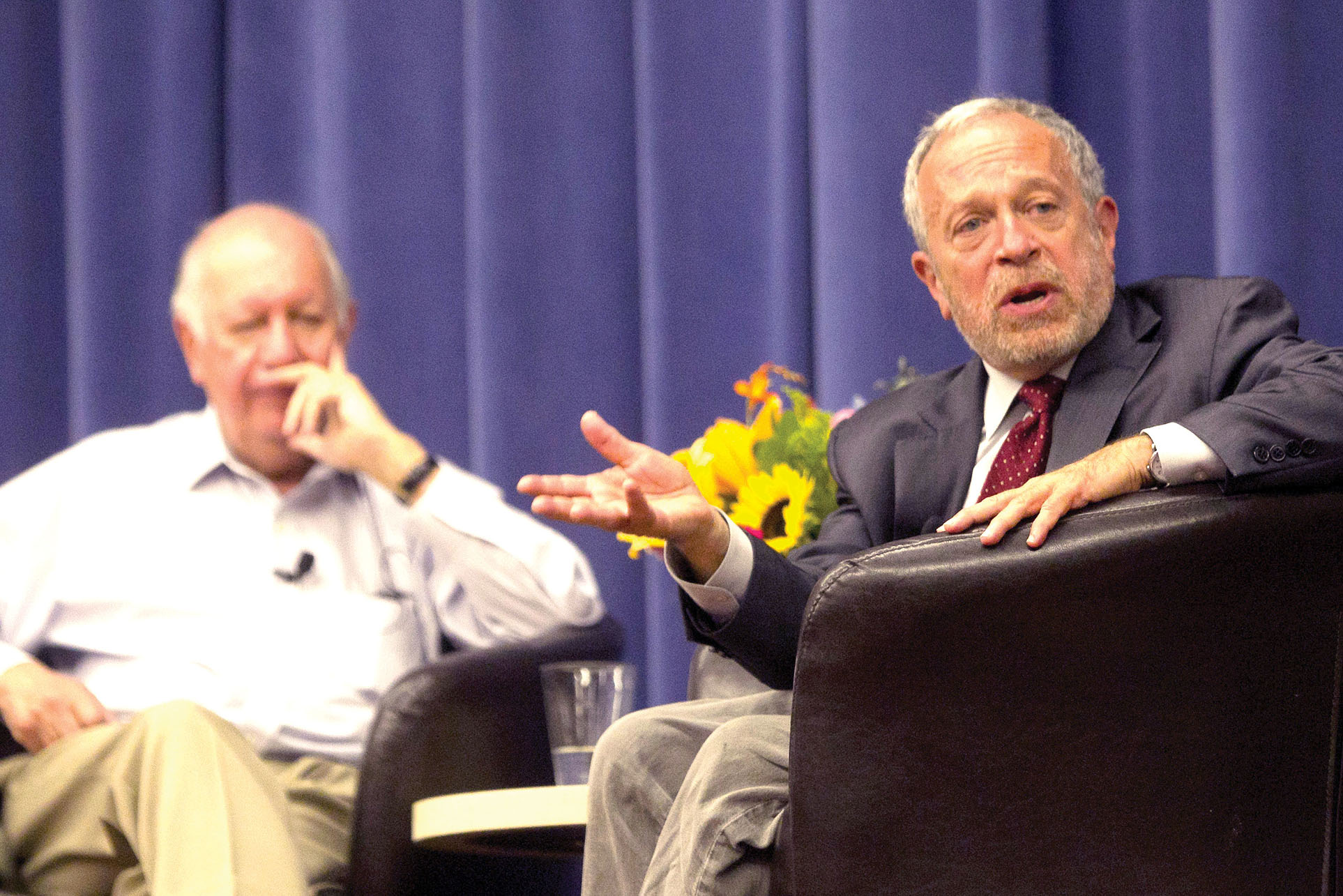Despite significant economic gains over the past decades, inequality remains a critical issue in most parts of the Americas. According to the 2011 United Nations Human Development Index, Latin America as a region continues to suffer from the most unequal income distribution in the world. Similarly, in the United States, the incomes of the top 1 percent of earners grew by about 275 percent between 1979 and 2007, while the average pre-tax income of the bottom 90 percent has actually decreased.
Chilean President Ricardo Lagos (2000-06) and UC Berkeley professor of Public Policy Robert Reich brought their unique perspectives on this disturbing trend to a discussion that marked the beginning of the CLAS-sponsored series “Inequality in the Americas.”
Since World War II, the U.S. economy has grown almost continuously, due to both productivity increases and population growth. During the first three decades after World War II, as Reich pointed out, “everybody gained.” These economic trends, along with the struggle for civil rights during the 1960s, led to increasing social equality. In addition, major investments in secondary and higher education, job training, and welfare programs “functioned like trampolines for many people who were in the workforce,” Reich argued.
Beginning in the late 1970s, “a giant U-turn in the U.S. economy” took place. Notwithstanding continued increases in productivity and economic growth, there was “almost no sharing of productivity gains with anybody but those at the very top,” Reich maintained. In fact, real wages for large parts of society have either stagnated or even decreased over time. For example, an average male worker earns less today than he did 30 years ago, after adjusting for inflation. This decline in wages has had drastic implications for the economy as a whole. In fact, one of the main reasons for the slow recovery after the economic crisis of 2008, according to Reich, is the decreased purchasing power of the middle class.
The influence of labor unions has also decreased significantly over the last 40 years. In 1975 roughly 25 percent of private sector employees in the U.S. were unionized; today, this number is down to less than 7 percent. According to Reich, the resulting decrease in bargaining power of large parts of the workforce has contributed to the decline in real wages. Furthermore, he argued, this trend has been exacerbated by a slowdown in public investment in education, particularly higher education.
While Latin America also faces extremely unequal income distribution, historically the challenges faced by the region have been quite different from those confronting the United States. President Lagos explained that Latin America first needed to decrease poverty before being able to focus on equality.
In the years following Chile’s 1990 return to democracy, the first priority was to increase overall economic growth and to use some of the gains to fight poverty. This strategy has proven quite successful. While nearly 40 percent of Chilean families lived under the poverty line in 1990, today, this number is down to about 13 percent, due to sustained economic growth and policies targeted at poverty reduction. In light of this trend, Lagos concluded, “We have been quite successful vis-à-vis reducing poverty, but still our distribution of income is one of the worst in the world — the worst as a continent.”

Indeed, growth-led poverty reduction is quite different from reaching a more equal distribution of income in a society. Lagos reasoned that the tools needed to reduce poverty from 40 percent to about 15 or 20 percent are very different from those needed to reduce it further. Once a country’s per capita income reaches the $20,000 a year threshold (at purchasing power parity), improvements in social indicators such as life expectancy, infant mortality, and crime rates are strongly associated with more equal distribution of income. Since several countries in the region are expected to cross this threshold within the next five to eight years, improving income distribution will become the new priority. Therefore, the appropriate measure of development will no longer be the average per capita income, Lagos argued, but rather “how income is distributed in that country.”
A progressive tax system is one way to reduce inequality. However, in Chile, as in most of Latin America, income distribution before and after taxes is almost identical. Lagos advocated implementing a progressive tax system to create a more level playing field, with additional revenue allocated to increasing educational opportunities and other programs that benefit the emerging middle class.
The “Washington Consensus” did not “realize that growth was not enough because growth is not always going to trickle down to the rest,” Lagos argued.
“The ‘Chicago Boys’ think that a society has to be shaped according to market forces,” he said, referring to the historically influential group of Chilean economists educated at the University of Chicago, but in a democracy, society should be “formed according to the views of the citizens.” In the end, he concluded, the purpose of politics “is to make a difference.”
Ricardo Lagos was president of Chile from 2000 to 2006 and is president of the Fundación Democracia y Desarrollo. Robert Reich is the Chancellor’s Professor of Public Policy at UC Berkeley and served as U.S. Secretary of Labor during the Clinton administration. They spoke for CLAS on September 11, 2012.
Mathias Poertner is a Ph.D. student in the Charles and Louise Travers Department of Political Science at UC Berkeley.


